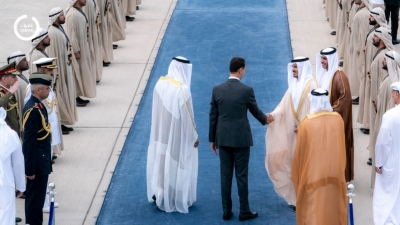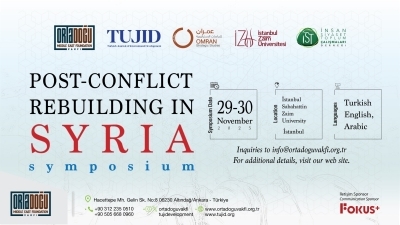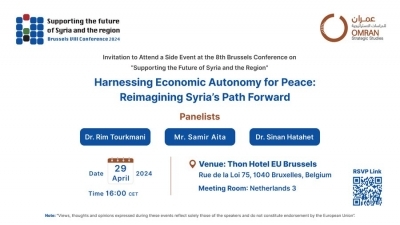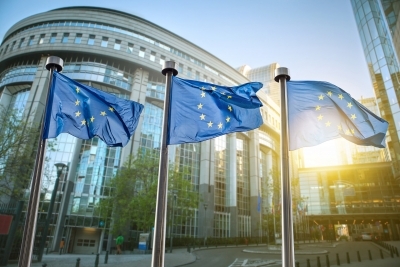General Summary
This report provides an overview of the key events in Syria during the month of November 2023, focusing on political, security, and economic developments. It examines the developments at different levels.
- Politically, the political stance of Assad's regime towards the Israeli aggression on Gaza was aligned with Iran's approach of non-escalation and was consistent with the prevailing Arab official stance, attempting to use the event to increase interaction with the Arab and regional surroundings. However, the issuance of a French arrest warrant against Bashar al-Assad and other officials may negatively impact Assad's efforts to break his diplomatic isolation.
- Security, the ongoing war in Gaza cast its shadow over the security situation in Syria. Israel intensified its airstrikes against various military and logistical sites, notably the Damascus and Aleppo airports, which were put out of service again, while Iran-backed militias continue to expand their influence and move their forces to Syria's southern borders.
- Economically, inflation rates rose by over 800% in the last quarter of this year. The regime's government began exporting citrus crops from the coastal region to Iraq, marking a first-of-its-kind step between the two countries. The Chinese government also plans to provide support to the regime in telecommunications and solar energy.
Syrian Political Landscape: Assad's Diplomatic Maneuvers and Opposition Movements
Bashar al-Assad attended the Arab summit held in Saudi Arabia's capital. During his address, he denounced the Israeli aggression in Gaza, calling for an immediate halt to these acts and the facilitation of urgent aid to Gaza. Assad engaged in bilateral discussions at the summit with the leaders of Iraq, Egypt, Iran, and Mauritania seeking to mend ties with Arab and Islamic nations to alleviate his diplomatic seclusion and attempt to shift focus from his own human rights violations in Syria.
Simultaneously, Prime Minister “Hussein Arnous's” participation in the World Climate Summit in the UAE showcases the regime's keenness to engage in global forums, aiming to reintegrate into the international community and alleviate economic sanctions.
However, this diplomatic outreach coincides with a French arrest warrant issued against Bashar al-Assad, Maher al-Assad, and other Syrian officials, signifying a new chapter in the pursuit of justice for war crimes. This development poses a potential setback to Assad's diplomatic re-engagement efforts.
Domestically, Bashar al-Assad issued Legislative Decree No. 36 of 2023, offering a general amnesty for crimes committed before November 16, 2023. This move, not the first of its kind, seems to be an attempt to placate Arab and Western governments demanding such actions, and to reinforce the regime's stance on Arab initiatives for resolving the Syrian conflict. However, statistics show that less than 5% of opposition detainees have benefited from such amnesties, leaving over /135,000/ detainees still incarcerated since the revolution.
On the Syrian Opposition front, there has been a notable increase in meetings with envoys from various countries and international entities, with a focus on humanitarian issues and calls for enhanced European support, particularly in education. Key meetings include:
- The Syrian Negotiating Commission (SNC) Chairman met with the U.S. Deputy Assistant Secretary of State.
- The SNC delegation met with envoys from the USA, UK, France, Germany, the Netherlands, Switzerland, EU, Turkey, Italy, Denmark, Canada, Egypt, Qatar, and UN envoy Geir Pedersen in Geneva.
- The National Coalition of Syrian met with the Dutch Ministry of Foreign Affairs delegation in Istanbul.
Israeli Strikes in Syria: A Strategic Overview
Since the beginning of the Israeli aggression in Gaza, there have been about /23/ Israeli strikes targeting various locations in Syria, including /9/ strikes in November across the Damascus countryside, Daraa, and Homs. A notable strike was at Damascus International Airport, causing a temporary shutdown. Concurrently, Russia permitted Iranian flights from Tehran to land at the Khmeimim Air Base, as Damascus and Aleppo international airports were inaccessible. Additionally, these strikes hit air defense systems at Mezzeh military airport.The Israeli strikes were executed for several reasons:
- Retaliation against unidentified shelling from Daraa's countryside towards the occupied Golan Heights.
- Intent to impede the movement of Iranian officials into Syria.
- To deter the Syrian regime and Iran from escalating the conflict with Israel.
In Southern Syria, Iranian militias have expanded control near the occupied Golan border, transferring fighters from the Iraqi Popular Mobilization Units (PMU) and local militias from Deir Ezzor to the southern frontlines, meanwhile the regime's recent arrest campaign in southern Syria neutralized Russian-affiliated military personal, expanding by that the security gab in the southern region, while will allow Iran’s militia to expand and in increase its presence over there, posing a constant threat and serving as a leverage tool against the international community concerning Tehran's nuclear program and support for the Assad Regime.
In North-Eastern Syria, to secure the Syrian-Turkish border, prevent PKK infiltration, and combat drug and human trafficking, the Ministry of Defense of the Syrian Interim Government deployed 3,000 Syrian National Army members in border guard brigades. The National Liberation Front in Idlib province merged with smaller factions, reducing their number for more effective ground forces.
In Eastern Syria, “Tribal Forces” attacked Syrian Democratic Forces (SDF) positions in Deir Ezzor's eastern countryside. Turkish drones also conducted air raids in Hasakah province, resulting in casualties among the SDF.
Amid the global preoccupation with the war in Gaza, and in order to achieve field gains for the benefit of Assad's regime, Russian warplanes conducted several raids in different regions in Syria:
- /30/ raids in Idlib and Hama countryside targeting Hay'at Tahrir al-Sham and Ansar al-Tawhid, and supply lines in the al-Ghab Plain, claiming to target a drone depot in Idlib. HTS conducted /64/ operations against the regime, resulting in nearly /30/ fatalities among the Regime fighters.
- /60/ raids against ISIS hidden cells areas of presence in Hama desert, Homs, Deir Ezzor, and Raqqa, killing /13/ ISIS members. Meanwhile, in response to the 17’s ISIS cells recent attacks in Homs, Deir Ezzor, Raqqa, and Aleppo, causing /73/ fatalities, predominantly regime forces.
Syrian Economic Turmoil: Central Bank Struggles, Regional Partnerships, and Local Challenges
In the Regime Held-Areas, The Central Bank of Syria has been continuously floating the Syrian Pound's (SYP) value against foreign currencies, devaluing it by over 300% since the start of the year. The Syrian Pound’s recent valuation stands at /12,600/ SYO against the U.S. $, covering both cash exchange and foreign transfers. This strategy reflects the Central Bank's struggle against foreign exchange shortages, funding scarcities, and the challenge of combating the black market. This devaluation is a sign of the Central Bank's inability to stabilize prices, with inflation in Syria soaring to 800% in the last quarter of 2023. This dramatic inflation is attributed to the regime's diversion of resources to the military, production paralysis, scarcity of commodities, and international sanctions.
In a move to bypass sanctions and strengthen banking and trade relations, the Governor of the Central Bank of Iran, “Mohammad Reza Farzin”, visited Damascus. Both nations agreed to use local currencies in trade and establish communication channels between their central banks. Iran also plans to open its first bank in Syria soon.
Following Bashar al-Assad's visit to China, the Chinese government intends to support Syria in communications and solar energy, including expanding maritime digital transport equipment in Tartus and enhancing the international gateway.
Simultaneously, the Syrian regime is working to enhance economic relations with neighboring and allied countries. This includes updating a 1969 air transport services agreement with Iraq and initiating citrus fruit exports from Syria's Sahel region to Iraq, a first between the two countries.
In Latakia, the Farmers' Union warns of the potential extinction of cattle breeding due to soaring production costs, especially for fodder. Dairy and cheese prices have escalated, and the regime has increased fertilizer prices by about 200%, leading to higher food product prices. The meat market is also affected, with chicken prices in Homs governorate hitting /35,000/ SYP per kilo, leading to the closure of 75% of poultry farms due to financial losses.
As food and other product prices rise, the regime government has increased the cost of “unsubsidized” bread by over 100%.
In the SDF Held-Areas, transportation fares between northeastern Syrian cities and towns have been raised by 25% for the second time in two months.
Farmers in Deir Ezzor's eastern countryside face agricultural production challenges due to water scarcity and the Administration's failure to provide irrigation water and fuel distribution, threatening the effectiveness of land cultivation.
In the Opposition Held-Areas, the Ministry of Agriculture of the Syrian Interim Government launched a wheat crop support project in Aleppo's countryside, aiming to cultivate /2,000/ hectares with the support of the Trust Fund for the Reconstruction of Syria. The project encompasses several cities and towns, including al-Ghandoura, al-Rai, Bza'a, Marea and Azaz
Additionally, a 2-million-euro solar energy project for drinking water pumping stations was inaugurated in al-Bab city, funded by the Syria Recovery Trust Fund. This project, the largest of its kind in northern Syria, will serve 200,000 people with 2547 solar panels. Lastly, the “Sakan Foundation” continues its “Safe Haven” project in Kafr Taanour village, constructing /400/ residential houses for /2,396/ beneficiaries.







